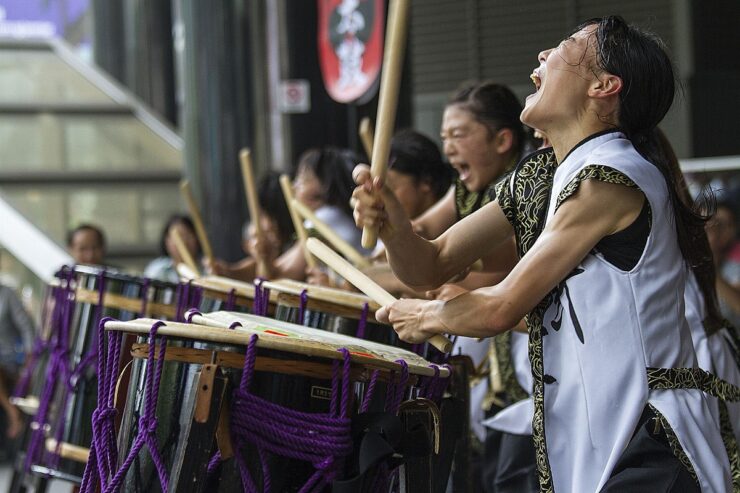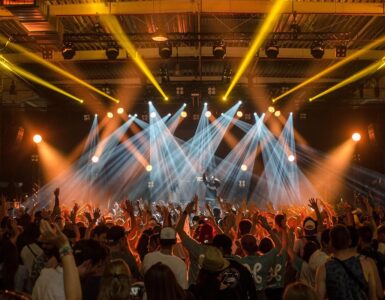Music is an integral part of nearly every event. It doesn’t matter if you hire a band to get people on the dance floor or just put some tunes in the background; selecting the appropriate music may transform an ordinary event into an unforgettable one. You have two alternatives for selecting music for your event: live music or recorded music. They all have their pros and cons. This article will assist you in determining which choice is best for the event you are planning.
Factors To Consider When Choosing Live Music Or Recorded Music
1. Type Of Event
First, examine the event kind and music’s purpose. This can help you decide how much of your money to allocate to music, influencing your choice between live music or recorded music. You may want background music if you’re throwing an IT networking event, but don’t expect people to engage with it.
In this situation, a live band would be wasteful. Play recorded music gently through the venue’s sound system. However, music may be a major attraction if you’re organizing a block party. You undoubtedly anticipate a bustling atmosphere on the dance floor. So, hire a band capable of injecting a lot of energy into the event.
2. Predictable And Sense Of Flow
Musical recordings are entirely trustworthy. When you press play, you already know what you will get. Unless something goes wrong with your hardware, there will be no mistakes or issues. Recorded music is the best option if you want to know precisely what you’ll hear.
Live music, on the other hand, allows for mistakes. Your visitors may not enjoy their time at your event if the musician plays poorly, forgets the songs, or improvises. But they may also put on a show that will leave your visitors in awe. It’s impossible to know what will happen.
However, in some situations, it’s preferable to use live music. If your audience enjoys improvisation, interaction with the band, or a crazy cover song, your event may benefit from live music. Others think they appreciate it when artists make mistakes because it gives the song a more authentic and alive vibe.
3. Space And Equipment

When it comes to making music, a live band needs several different instruments. They will bring their equipment, including microphones, amplifiers, speakers, and dozens of large plastic boxes. At least five components make up a drum set, but some drummers have as many as twenty. The band needs extra room to set up and store the equipment they are not currently using.
If you have a band, remember that you’ll need a designated area where they can perform. Recorded music takes practically minimal room and very little in the way of specialized equipment. A DJ has the ability to squeeze into tight spaces. If you want to keep your costs to a minimum, you may stream music from your pocket using a smartphone loaded with Spotify.
You should inquire with a music provider about how much room they require to provide their service before engaging them. Ask them to meet you at the place where the event will take place and show you where they will set up, or request a schematic with dimensions.
3. Hiring Process
The process of hiring a live music performance is time-consuming. Find a few bands that fit your criteria and either see them play or hire them to perform mainly for you if they are available (which is time-consuming). It’s not enough to watch one of their videos on YouTube. You can only experience it if you’re in the same room as them while they perform.
Choosing a live music source necessitates working with them to develop the setlist. You’ll undoubtedly have to make some concessions because their library is limited to what they already know or could study before your event.
While this may not be a drawback if you’re looking for something basic like background jazz, it might be a significant problem if you want the band to perform current, popular music. When using recorded music or hiring a DJ, you don’t have to worry about them having to put on a show because their libraries are endless.
4. Consider The Cost
Cost, as always, is the most significant factor. Budgeting properly is essential. A successful event relies on adhering to a specific budget. Unless you hire a famous DJ, live music is nearly usually more expensive than recorded music. A band will have to spend more time setting up and dismantling than a DJ. You may also need to provide food for the entire crew.
However, this does not imply that hiring a DJ is an inexpensive option. Nowadays, numerous DJs put on a good performances. If your event is accessible to the public, they’ll bring their fan base. Live music can be more expensive, but a local DJ with some emcee abilities will usually be less expensive.
Final Thoughts
You should already understand how live music differs from recorded music based on the above tips. Recorded music is less expensive than live performances, but it’s also less attractive. However, live music is more engaging and participatory, but it is also more costly and challenging to organize.
But in the end, it’s up to you to make the final decision. This is something we are unable to provide for you. Take your time, and don’t feel compelled to make a decision. Consider your visitors, budget, and event needs before making a decision.
Now that you know the Factors To Consider When Choosing Live Music Or Recorded Music, take a trip over to our entertainment section to see more interesting articles such as Worst Movies Ever According To Rotten Tomatoes, Movies-With-The-Most-Memorable-Endings, and 10-Greatest-Iconic-Opening-Lines-To-Songs trashed.












